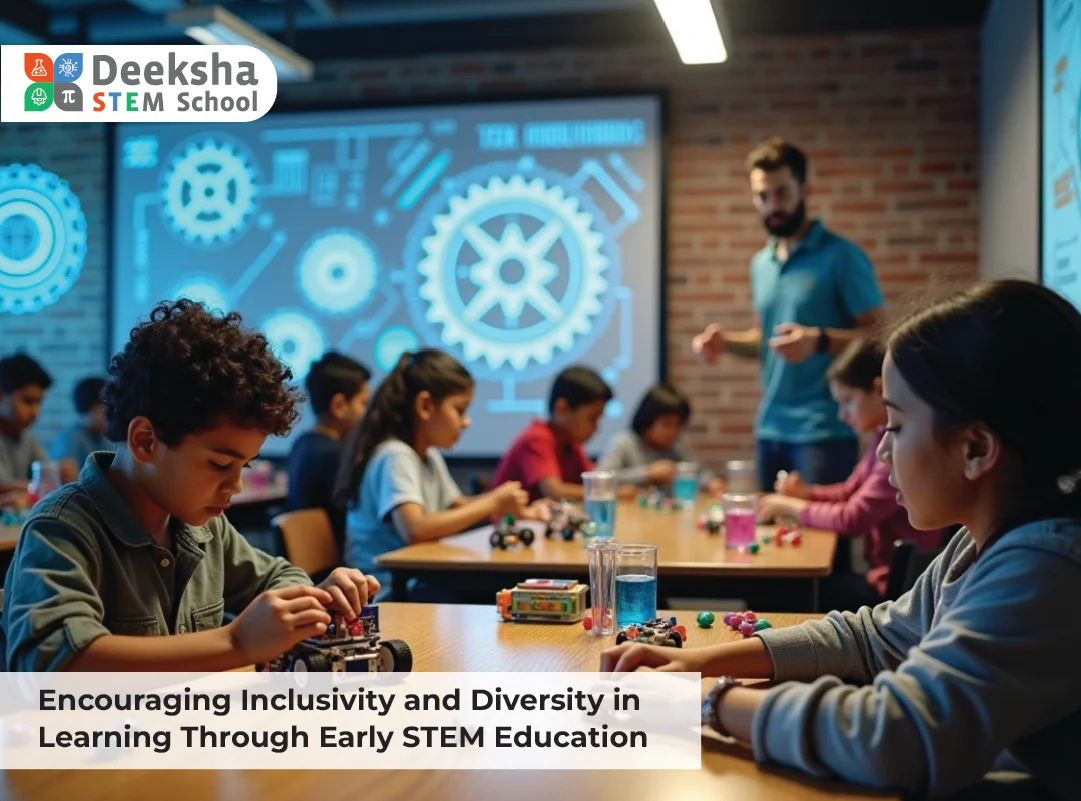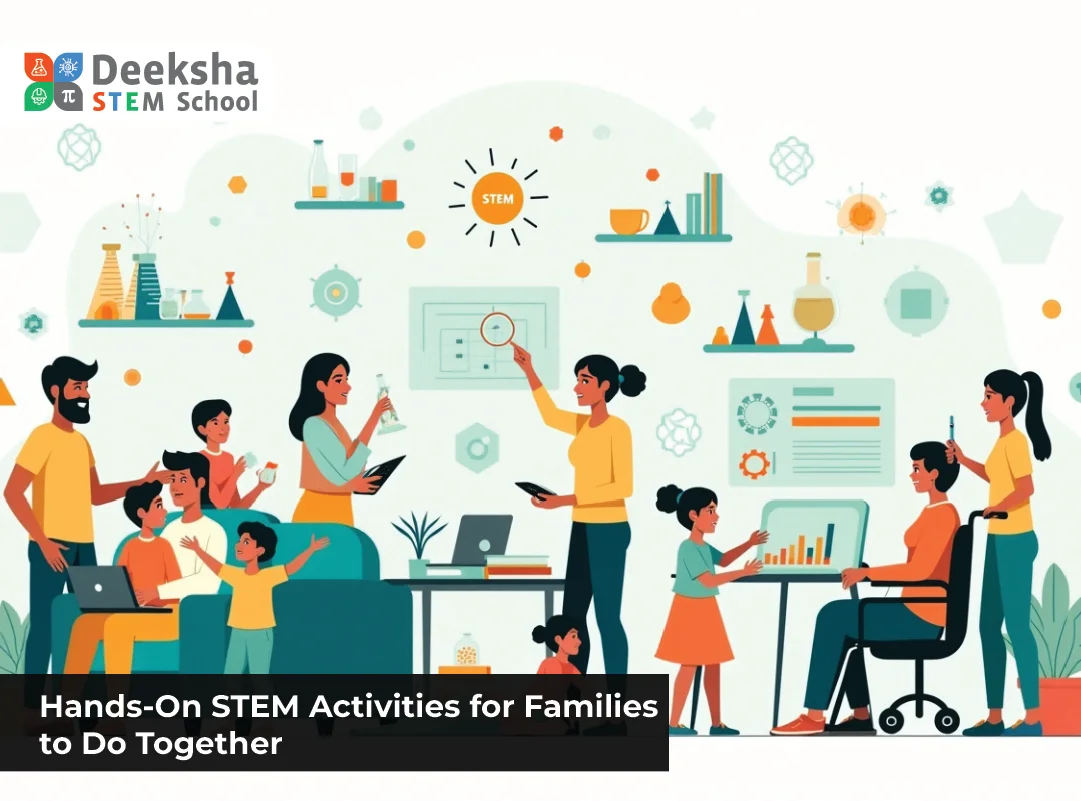Encouraging Inclusivity and Diversity in Learning Through Early STEM Education

STEM (Science, Technology, Engineering, and Mathematics) education is a powerful catalyst for innovation, creativity, and societal progress. However, to unlock its full potential, it must be accessible to all students, regardless of gender, ethnicity, socioeconomic background, or ability. By fostering inclusivity and diversity in STEM education from an early age, we ensure that every student has the opportunity to contribute to future technological advancements.
At Deeksha STEM Schools, our mission is to create an equitable learning environment where each student can explore their potential, innovate, and succeed. By promoting diversity and equal access to educational resources, we cultivate a future-ready workforce that reflects the global community’s richness and complexity.
Why Inclusivity in STEM Education Matters
STEM disciplines have traditionally faced significant challenges in ensuring equal representation across different demographics. A lack of diversity within these fields can stifle innovation, limit creativity, and reduce the range of perspectives brought to scientific problem-solving. By prioritizing inclusivity in STEM learning, we can:
- Encourage Diverse Ideas: Different backgrounds foster diverse perspectives, leading to more creative and innovative solutions.
- Close Opportunity Gaps: Providing all students, regardless of gender, race, or economic status, with equal access to STEM resources ensures equitable opportunities.
- Foster a Competitive Global Workforce: A diverse and inclusive STEM workforce is essential for addressing complex global issues with creative, multifaceted solutions.
- Promote Economic Growth: Encouraging diversity in STEM supports broader economic development by including voices from all sectors of society.
Barriers to Inclusivity in STEM Education
Despite numerous advancements in education, various systemic barriers continue to limit access to STEM opportunities for underrepresented groups. Common challenges include:
- Lack of Representation: When students do not see role models who look like them, they may feel excluded from STEM fields.
- Inequitable Access to Resources: Students in underprivileged communities often lack access to essential learning materials, modern technology, and well-equipped laboratories.
- Implicit Bias and Stereotypes: Cultural biases can create an environment where students from marginalized groups feel discouraged from pursuing STEM fields.
- Inadequate Support Systems: Many students lack access to mentorship programs, supportive learning environments, and encouragement from educators and peers.
How Early STEM Education Promotes Inclusivity
Introducing STEM concepts early helps nurture curiosity and confidence, particularly for students from traditionally underrepresented backgrounds. Here’s how early exposure supports inclusivity:
1. Providing Equal Access to Practical STEM Experiences
Creating opportunities for hands-on engagement ensures that every child can develop an interest in STEM subjects:
- Project-Based Learning: Encourages collaboration and real-world problem-solving through group projects.
- Interactive STEM Labs and Maker Spaces: Offers students access to advanced tools and technologies that stimulate creative exploration.
- Inclusive Coding and Robotics Initiatives: Provides all students with opportunities to learn programming, automation, and engineering basics.
2. Highlighting Diverse Role Models and Mentors
Representation inspires ambition. When students see leaders from similar backgrounds excelling in STEM fields, they are more likely to pursue similar pathways.
- Showcasing Diverse STEM Achievers: Highlighting scientists, engineers, and innovators from various backgrounds.
- Organizing Inspirational Guest Lectures: Featuring professionals who share their personal journeys in STEM.
- Establishing Mentorship Programs: Connecting students with industry leaders for career guidance and inspiration.
3. Developing a Culturally Responsive Curriculum
A well-rounded STEM curriculum must reflect global perspectives and address the unique challenges faced by diverse communities:
- Integrating Real-World Challenges: Encourages students to solve problems that affect global and local communities.
- Creating Inclusive Educational Materials: Featuring contributions from scientists, technologists, and innovators from diverse backgrounds.
- Promoting Team-Based Learning: Encourages collaboration among students from various cultures and abilities.
4. Increasing Participation in Competitions and STEM Programs
Providing equitable opportunities for all students to showcase their talents helps foster confidence and engagement:
- Inclusive Competitions: Ensuring that all students can access and participate in science fairs, coding contests, and robotics challenges.
- Scholarships and Grants: Offering financial support to enable students from underprivileged backgrounds to participate in workshops and enrichment programs.
- Supporting Female Participation: Encouraging girls to engage with STEM through focused initiatives and mentorship programs.
How Deeksha STEM Schools Promote Diversity and Inclusion in STEM
At Deeksha STEM Schools, we have embedded inclusivity and diversity at the core of our educational framework. Our approach ensures that every student has the resources and support needed to excel in STEM fields:
1. Holistic STEM Curriculum for All Students
Our CBSE-integrated STEM curriculum ensures that every student, regardless of background, receives a balanced and comprehensive education.
2. Advanced Hands-On Learning Opportunities
Our state-of-the-art laboratories and maker spaces provide an interactive learning environment for all students, encouraging creativity and practical application.
3. Comprehensive Mentorship and Career Support
We partner with STEM professionals from diverse backgrounds to offer mentorship and career counseling, helping students develop confidence and ambition.
4. Community Engagement and Outreach Programs
We actively engage with underprivileged communities through workshops, seminars, and interactive STEM activities that promote interest and participation in science and technology.
5. Gender Equity Initiatives
Our programs encourage young girls to pursue careers in science, technology, engineering, and mathematics, breaking traditional gender barriers and fostering equality.
The Future of Inclusive STEM Education
The future of innovation relies on a diverse and inclusive workforce capable of solving global challenges through collaboration and creativity. As technology continues to evolve, it is essential that education systems provide equitable opportunities for every student.
Encouraging inclusivity in STEM fields ensures that all voices are heard and valued. Fostering a culture of diversity prepares students to develop groundbreaking solutions that address real-world problems from various perspectives.
Conclusion
Promoting inclusivity and diversity through early STEM education is vital for creating an equitable, forward-thinking society. By breaking down systemic barriers and offering equal access to resources, we empower every student to unlock their potential and become future leaders in science and technology.
At Deeksha STEM Schools, we are committed to providing an inclusive and inspiring educational experience. By prioritizing diversity in STEM, we help our students develop the skills and confidence they need to thrive in a global economy. To learn how Deeksha STEM Schools can prepare your child for a diverse and inclusive future, connect with us today.




